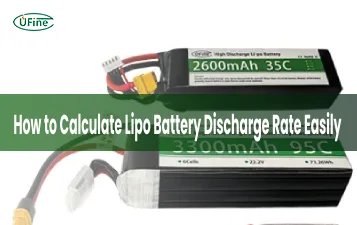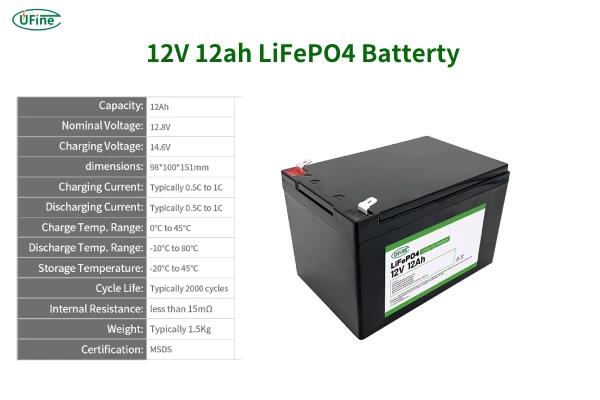Part 1. Understanding the 12Ah lithium battery
In today’s world, where devices demand more power but in smaller, lighter packages, the 12Ah lithium battery stands out as a true workhorse. Whether you’re building an electric bike, powering a solar setup, or assembling a mobile medical unit, this battery delivers consistent energy with exceptional efficiency.
But what does “12Ah” actually mean?
Ah, or ampere-hours, is a unit that tells you how much charge the battery can hold. A 12Ah battery can deliver 12 amps for one hour, or 1 amp for 12 hours. It’s a simple number, but it holds massive implications for how long your devices can run.
People often overlook the importance of this figure, but in reality, it’s your battery’s stamina. And when stamina is essential—especially in life-critical systems or mission-driven tools—this number is everything.
Part 2. Chemical types
Not all lithium batteries are the same. In fact, the chemistry inside them greatly impacts their performance, weight, safety, and lifespan. Here are the most common chemistries used in 12Ah lithium batteries:
Li-ion (Lithium-Ion):
These batteries are known for their high energy density. That means they pack a lot of power into a small, lightweight form. You’ll often find them in power tools, laptops, and e-bikes. However, they require proper battery management to prevent overcharging and overheating.
LiFePO4 (Lithium Iron Phosphate):
If you need safety and long life, LiFePO4 is the clear winner. These batteries offer incredible thermal stability and can last over 2,000–3,000 charge cycles. That makes them a favorite for solar storage, electric vehicles, and backup power systems.
LiPo (Lithium Polymer):
These are ideal for applications that need flexible shapes and lighter weight—think drones, remote-controlled vehicles, or compact electronics. They can discharge high currents quickly but are more sensitive to overcharging and physical damage.
At Ufine Battery, we offer all these types and more. As a leading custom lithium battery manufacturer in China, we tailor battery packs to your specific needs—whether it’s a LiFePO4 12Ah module for solar use or a lightweight LiPo pack for aerial drones.
Part 3. Common voltages: finding the right output for your devices
Voltage matters just as much as capacity. A 12Ah battery could come in various voltage options, depending on the cell configuration:
- 3.7V (Single cell): For small devices like GPS trackers and flashlights.
- 7.4V / 11.1V: Used in medium-sized electronics or robotics.
- 12V / 24V / 36V / 48V: These are more common in electric mobility systems, solar banks, and backup power units.
For example, a 12V 12Ah lithium battery delivers 144Wh (watt-hours) of energy. If you upgrade to a 24V version, you double the output without changing the capacity.
When designing a power system, always match the battery’s voltage to your device’s requirements. If you’re unsure, Ufine Battery’s team of engineers can help you design a fully compatible power solution.
Part 4. How long can a 12Ah lithium battery last?
This is one of the most asked questions—and for good reason.
To estimate runtime, use this formula:
Runtime (in hours) = Battery Capacity (Ah) ÷ Device Current Draw (A)
Let’s break it down with examples:
- A 12Ah battery powering a 3A device:
- → 12 ÷ 3 = 4 hours of operation.
- The same battery running a 0.5A device:
- → 12 ÷ 0.5 = 24 hours!
But remember—factors like battery age, temperature, and load variations can affect actual performance.
Also, the cycle life is worth noting. A well-made 12Ah lithium battery can last 1,000 to 3,000 cycles. That’s several years of daily use. And if you’re looking for extra-long lifespan, LiFePO4 chemistry is the best choice.
Part 5. 12Ah lithium battery vs. lead-acid and NiMH: A clear winner
You might wonder: “Why should I switch to lithium?” Let’s compare:
| Feature | 12Ah Lithium Battery | Lead-Acid Battery | NiMH Battery |
|---|---|---|---|
| Weight | Light (1–3kg) | Heavy (4–8kg) | Medium (3–5kg) |
| Lifespan | 1000–3000 cycles | 300–500 cycles | 500–800 cycles |
| Efficiency | 95%+ | 70–80% | 80–85% |
| Charge Time | 1–3 hours | 6–12 hours | 3–5 hours |
| Maintenance | None | Frequent | Occasional |
The 12Ah lithium battery outshines its competitors in nearly every category. It’s lighter, lasts longer, charges faster, and offers better energy output. It’s no surprise that lithium is fast replacing traditional chemistries in almost every field.
Part 6. Top applications
You’ll be amazed at how many systems rely on this battery capacity:
- Electric bikes & scooters: Lightweight, long-range power.
- Solar energy storage: Efficient, deep-cycle performance.
- Medical devices: Reliable power in life-critical moments.
- Portable power stations: Great for camping, travel, and emergency kits.
- Agricultural drones and RC vehicles: Lightweight with high burst energy.
What’s common across all these applications? They need trust. They need consistency. They need safety. That’s why the 12Ah lithium battery is a favorite.
Need a custom battery pack for your application? Ufine Battery can design a 12Ah lithium battery tailored to your specs—size, voltage, rate, and more.
Part 7. How to extend the life of your 12Ah lithium battery
To get the most out of your battery, follow these best practices:
- Avoid full discharges. Keep the battery above 20%.
- Don’t overcharge. Use a proper smart charger.
- Store in a cool, dry place. Heat kills batteries faster than you think.
- Charge before storing long-term. Ideally, keep it at 50%.
- Avoid high-drain devices if not needed. Match usage to the rated output.
Think of your battery like a living tool—it thrives with gentle handling and care.
Part 8. Choosing the right charger
The charger you use makes all the difference. For a 12Ah lithium battery, the right charger should match:
- Voltage: Never mismatch this. Use a 12V charger for a 12V battery.
- Current: A 2A–4A charger is usually safe. Higher amperage charges faster but generates more heat.
- Chemistry: Use LiFePO4 chargers for LiFePO4 batteries, and Li-ion chargers for Li-ion. Never mix them up.
Ufine Battery can supply chargers specifically optimized for your battery pack, ensuring both speed and safety.
Part 9. FAQs
Can I replace my 12Ah lead-acid battery with a lithium version?
Yes—just match the voltage and size. Lithium will be lighter and longer-lasting.
Is it safe to leave a 12Ah lithium battery charging overnight?
If you’re using a certified charger with overcharge protection, yes. But for safety, unplug after full charge.
Can I use this battery for solar storage?
Absolutely. LiFePO4 12Ah packs are perfect for storing solar energy and powering devices at night.
How do I know when it’s time to replace it?
A: If it holds less than 70% of its original capacity, consider a replacement.
Related Tags:
More Articles

LiPo Battery Discharge Rate Guide & Calculation Tips
Understand LiPo battery discharge rates, C-ratings, and how to calculate max current. Essential guide for RC, drones, and electronics users.
High‑Capacity 3S LiPo Batteries: 5000 mAh vs. 10000 mAh
Compare 3S LiPo 5000mAh vs 10000mAh batteries by weight, power, and use. Find the best fit for your drone, RC car, or boat setup.
Top 5 Applications for Small 3S LiPo Batteries
Small 3S LiPo batteries power drones, RC gear, wearables, and robotics with high energy and low weight. Making them ideal for compact electronics projects.
Building and Charging Your Own 3S LiPo Pack: A Step‑by‑Step Guide
Learn how to build, balance, and charge a 3S LiPo battery pack safely at home with this complete DIY guide for hobbyists and beginners.
How to Choose the Right LiPo Battery Plug Type?
Discover the best LiPo battery plug types, how to choose them, and expert tips for safe usage, soldering, and maintenance.




